Over the past two years, the Italian UNESCO Chairs have promoted a joint project entitled "UNESCO Chairs Dialogues: a workshop of ideas for the world that will come" to introduce the contribution of Italian UNESCO Chairs to the global challenge of sustainable development to a wide audience. The project was launched on the occasion of the first public on-line event that took place on 9 October 2020 and that had the participation, among others, of Stefania Giannini (ADG Education UNESCO), Franco Bernabè (President of the Italian Commission for UNESCO) and Patrizio Bianchi (then Minister of Education). They all agreed on the importance of collaboration between UNESCO Chairs to achieve the Sustainable Development Goals set by the United Nations 2030 Agenda.
The Italian UNESCO Chairs recently not only decided to launch a second edition of webinars on the New Social Contract for Education, based on the latest UNESCO report on the Futures of Education, but also to give to the experience of the "UNESCO Chairs Dialogues" greater stability and institutionalisation through the creation of a formal Network of Italian UNESCO Chairs. This Network will enable the Italian UNESCO Chairs to speak with one voice and to enforce cooperation between them as a way of implementing a new social contract in the field of research and academia.
Revision of the 1974 UNESCO Recommendation
ReCUI participated in the Special Intergovernmental Committee for the revision of the 1974 UNESCO Recommendation concerning education for international understanding, co-operation and peace and education relating to human rights and fundamental freedoms.
The second revised draft of the Recommendation was discussed and approved at the meeting of the Special Intergovernmental Committee (Category II) held from 30 May to 2 June and from 10 to 12 July 2023.
Revision of the 1974 UNESCO Recommendation
Bali Manifesto 'Embracing inclusion: a roadmap to lifelong learning for all'
ReCUI was present with a delegation at the Inclusive Lifelong Learning conference held in Bali, Indonesia, from 3 to 6 July 2023. On this occasion, the Bali Manifesto 'Embracing inclusion: a roadmap to lifelong learning for all' was approved.
1. Project title: Support for monitoring the implementation of the right to education (2020 - 2023)
Since 2020, the UNESCO Chair has been involved in a project promoted by the Fondazione Vittorino Chizzolini ONLUS of Bergamo in collaboration with the UNESCO Right to Education Programme. During the first two years, the collaboration mainly concerned the updating of some monitoring tools on the right to education in the world provided by UNESCO. The Fondazione set up a research group whose members participated on a voluntary basis, coordinated by a referent from the UNESCO Chair. The object of the work was to update some 'country profiles' of the Observatory on the Right to Education and the Atlas for the Right to Education of Women and Girls.
Since 2023, the collaboration project has been focused on writing some country reports based on the guidelines produced by UNESCO (https://unesdoc.unesco.org/ark:/48223/pf0000375352). In particular, the research team worked on the drafting of the Report on the Right to Education in Niger, which contains a number of recommendations that UNESCO will promote in order to urge the implementation of actions to strengthen the right to education.
2. Project "Alternative education for children and young people excluded from school in Niger: research action in the municipality of Niamey (1.01.2023 - 31.12.2024).
The project, which is financed by the Fondazione CARIPLO, is run in cooperation with the General Direction of Literacy and Non-Formal Education (Ministry of Education of Niger), the Ecole Normale Supérieure of the University Abdou Moummouni in Niger, the research group ERDIE of the University of Geneva and the NGO Action Éducative pour le Développement Local (AEDL_Espoir). The research aims to analyse current approaches to alternative education in Niger and to propose a relevant and sustainable model for education. Specifically, the aim is to offer an educational alternative to children currently excluded from any form of formal education. For the experimentation, ten classes per year have been identified on the outskirts of Niamey.
The Unesco Chair in "Education for Human Development and Solidarity Among Peoples", in collaboration with the School of Higher Education "Educare all'incontro e alla solidarietà" (LUMSA University - Rome) and the SCHOLAS Chairs (Scholas occurrentes, Fondazione Internazionale di Diritto Pontificio), supports the Maison de Paix project for the construction and initialisation of a Centre for Education and Human Promotion at Kikwit in the Democratic Republic of Congo. The project is promoted by the S.F.E.R.A. Onlus Association, founded in 2011 in Brescia.
The Maison de Paix project was set up in Kikwit, a diocese with 4 million habitants located about 500 km east of the capital Kinshasa. The project involves the construction of a multipurpose training centre. The centre is designed to help the local population to live a healthier and more productive life. For this, the S.F.E.R.A. association started by analysing the problems and by listening to the volunteers who were already working in the area and to the local population. This analysis highlighted three issues that also became the project's areas of intervention:
The project intends to build a preschool, two training centres for girls and boys, as well as a clinic and other service facilities.
The Unesco Chair will take part in the initiative by organising international conferences on the theme of education, promoting exchanges between students of the Faculty of Science of Education from the Università Cattolica del Sacro Cuore and teachers from the Preschool and the Training Centres implemented by the project, and promoting the realization of a summer centre for street children.
Mission in January 2020
In January 2020, the Unesco Chair working group, led by Prof. Simeone, went on a mission to Kikwit, in the Democratic Republic of Congo, where the Maison de Paix project is active for the construction and implementation of a Centre for Education and Human Promotion.
The mission also provided an opportunity to carry out a Service-Learning project that, by connecting the pre-school San Pio X in Sarezzo (Bs) and the Maison de Paix school, fulfilled the desire of boys and girls, located over five thousand kilometres away, to engage in dialogue with each other and reflect on the importance of cultural diversity.
Here the story of Vera Brunelli, the student who promoted and implemented the project.
Here the video about the Service Learning project in Kikwit.
photographs of the mission to Kikwit in January 2020
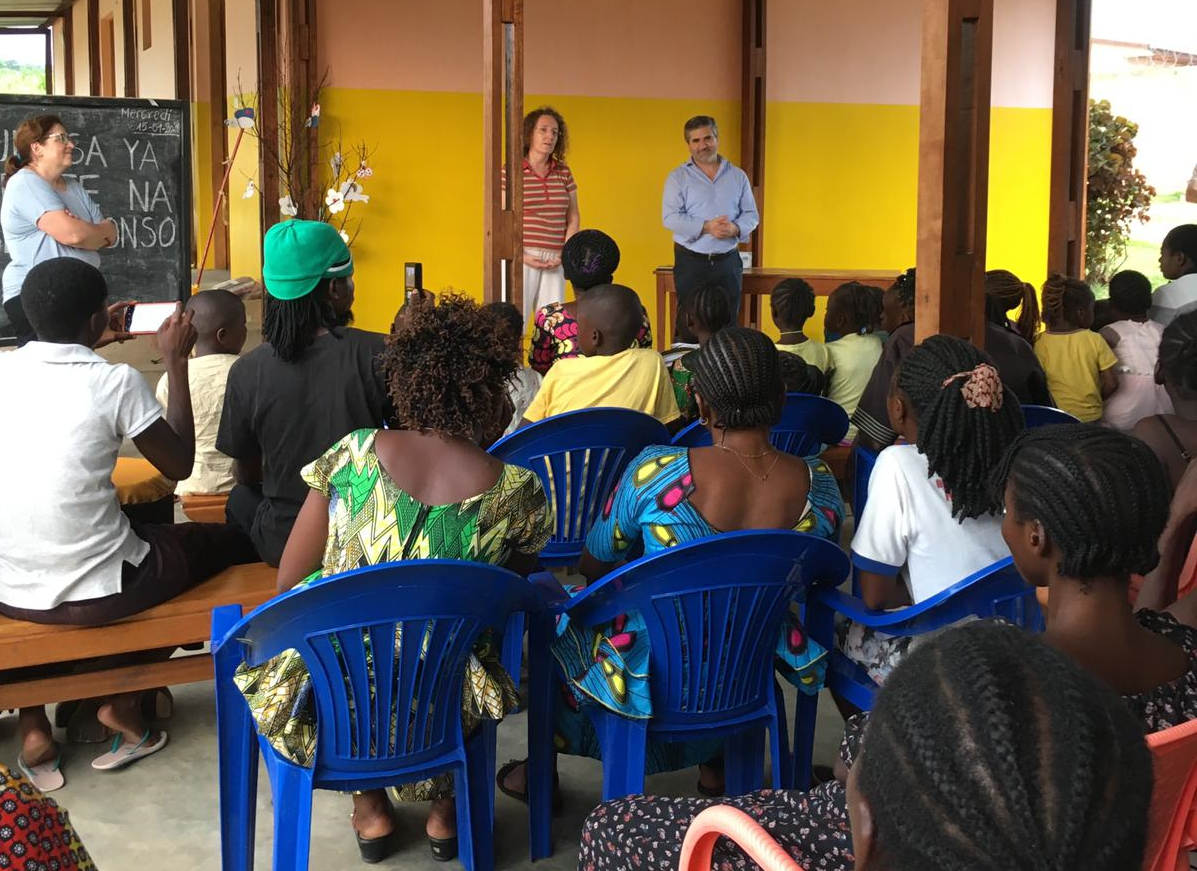
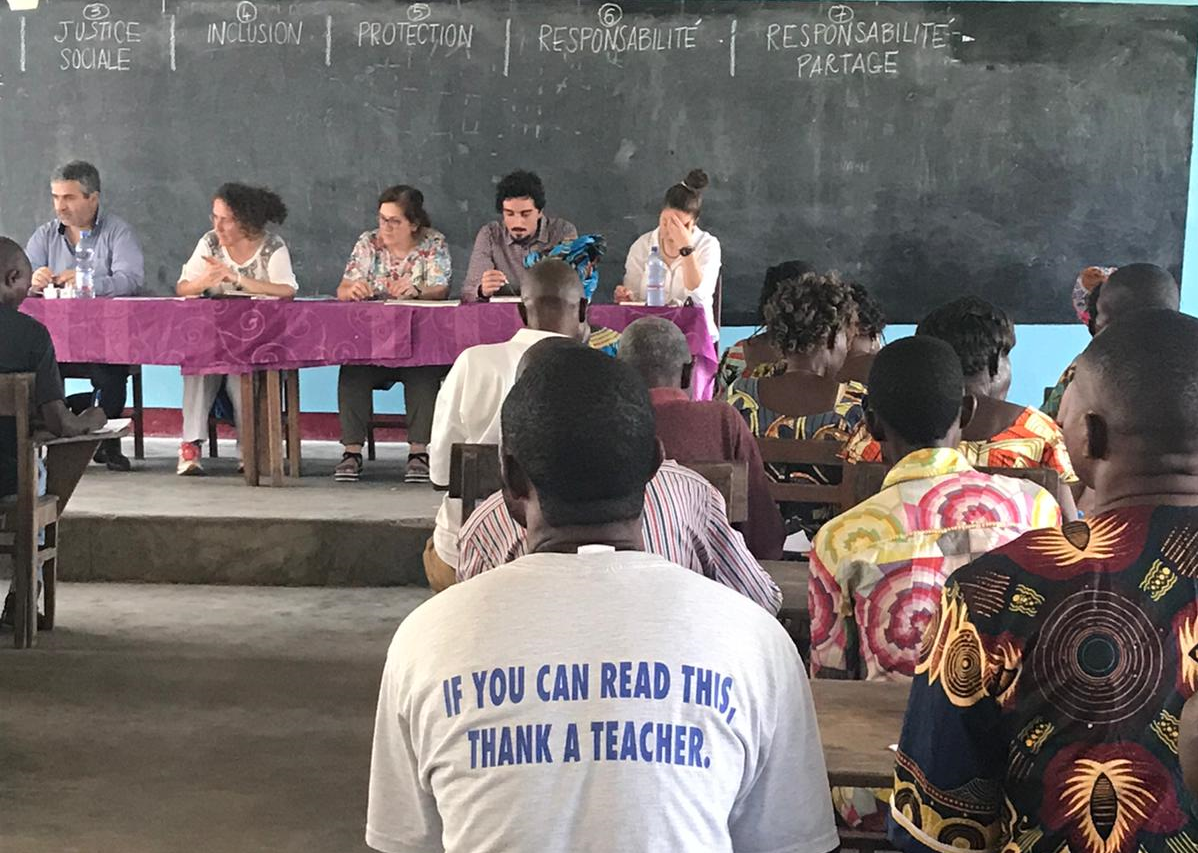
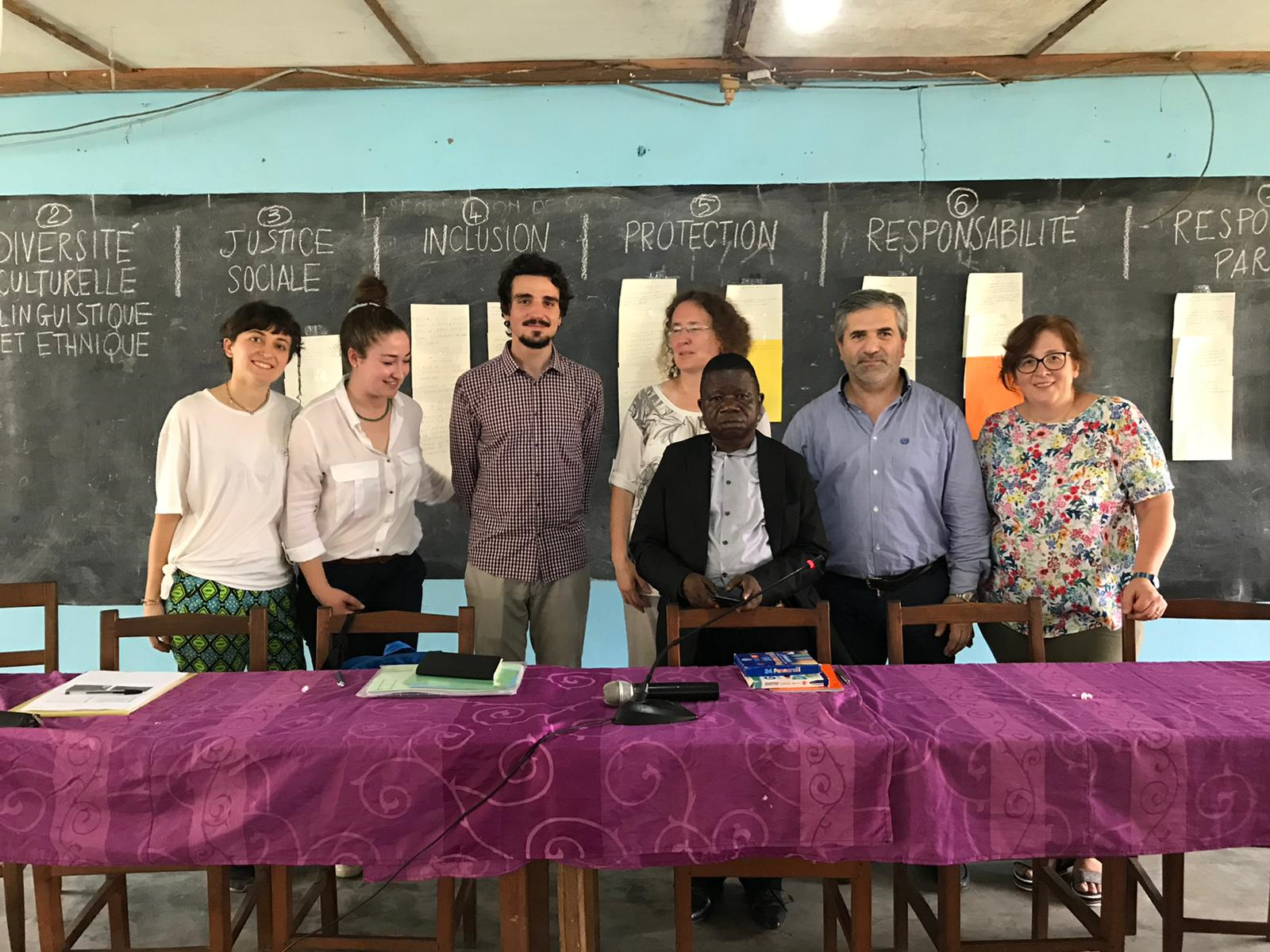
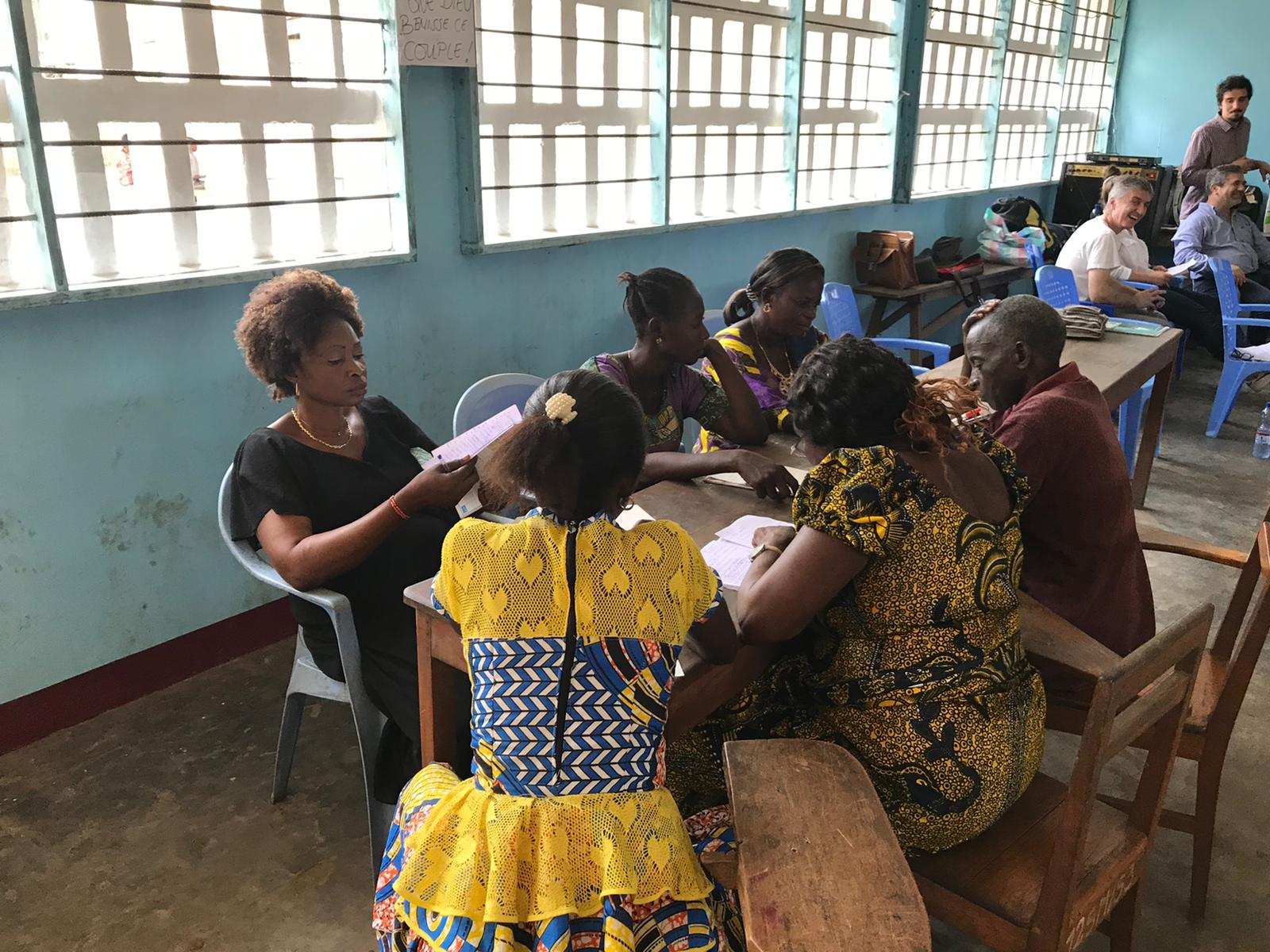
photographs of the mission to Kikwit in March 2024
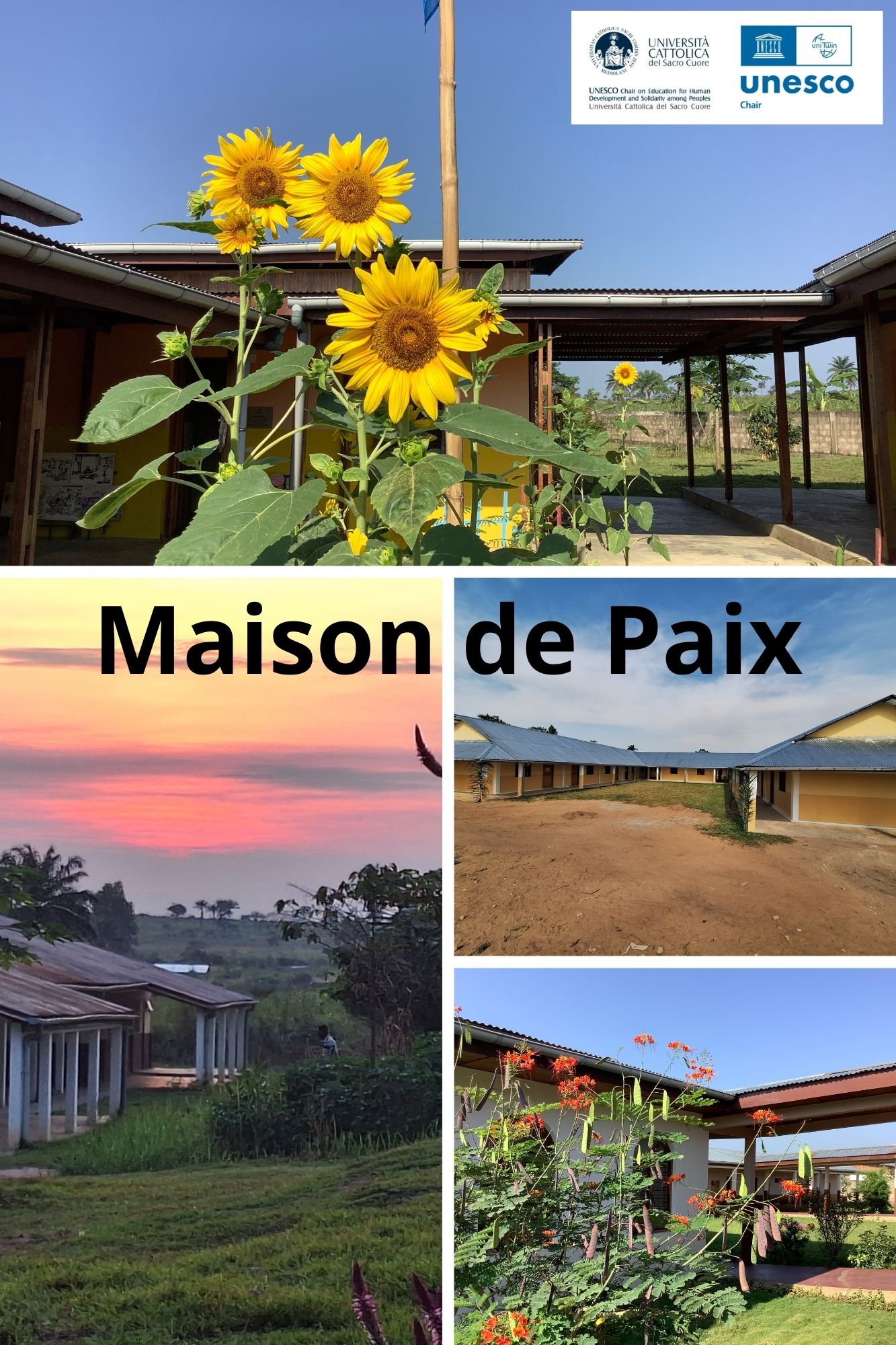
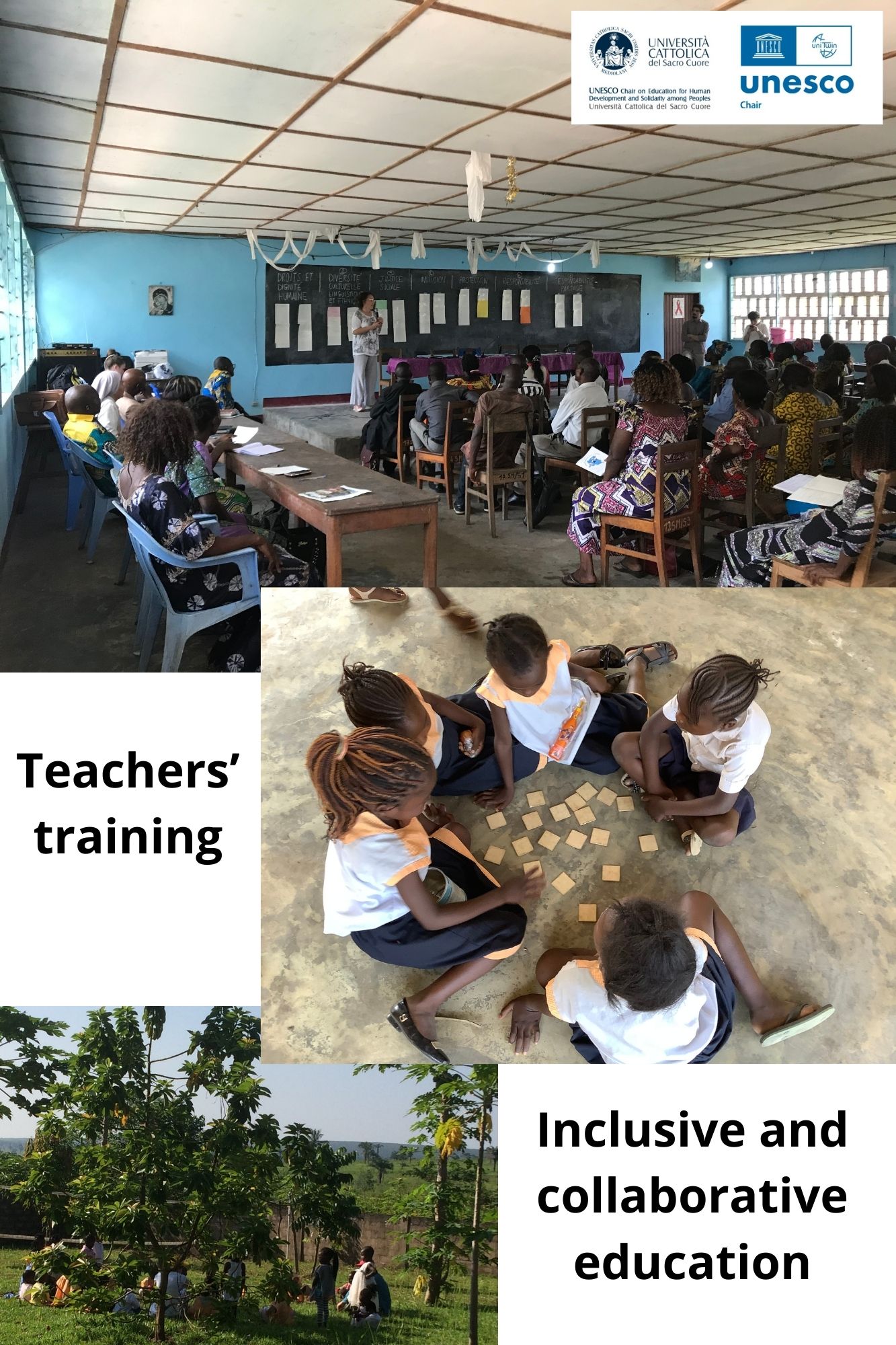
D.3.2. RESEARCH OF PARTICULAR INTEREST TO THE ATHENEO, year 2019 Research projects in the humanities and social sciences (CUN scientific areas 10 to 14) - Theme 2 - Politics and practices to combat poverty for integral and sustainable human development.
The VIVRE Research Project intends to contribute to analysing some of the interconnections between poverty highlighted by the 2030 Agenda for Sustainable Development, focusing on six forms of poverty: educational (SDG4), environmental (SDG13), agri-food (SDG2), healthy (SDG3), technological (SDG9) and historical-economic (SDG16). The project operates in the context of two urban realities characterised by economic, environmental, and social degradation: Kikwit (Democratic Republic of Congo) and a suburb of the metropolitan city of Milan. The objective of the research is to analyse at a multidisciplinary level and in a systemic way the manifestations and reciprocal influences of the six poverties in the two suburban contexts, one in a country with limited resources and the other in a high-income country.
Based on the analysis and following the principles of research-action, the second goal of the project is to test and monitor integrated anti-poverty interventions for an improvement in the living conditions of the two communities involved and to identify best practices of sustainable development that can be replicated in similar contexts through participatory paths.
Participation in the editorial project for the publication of a volume on 'Education privatisation in sub-Saharan Africa: Agendas, policies and trends'.
Researchers from the following institutions: Center for African Studies of the University of Porto, Portugal; School of Education, Campinas University and Federal University of Bahia, Brazil; University of Geneva, Switzerland; Università Cattolica del Sacro Cuore.
The Unesco Chair has been collaborating for several years in the validation of a project of the Fondazione Archimedu ETS. The Archimedu project is a proposal, currently in its initiation phase, to support schools of all levels based on the evidence (as also expressed in numerous Unesco documents and reports) that the investment in education constitutes a fundamental lever for the progress and development of a society. After a process of onboarding (selection and involvement in the project of institutes - national in the first phase - deserving in terms of investment in competences and didactic innovation) the schools included in the project will receive financial support through donations that will feed an endowment fund (according to a model already consolidated in Anglo-Saxon countries). In addition, a certain number of students with financial difficulties will be supported in their studies by a digital currency emitted by Archimedu.
After a general evaluation phase of the project, the Unesco Chair is currently completing the analytical validation period, which focuses on the overall soundness of the system from a pedagogical point of view and on technical aspects relating to the school selection criteria.
Dr. Michele Aglieri, Dr. Emanuele Serrelli and Dr. Dalila Raccagni are in charge for the validation process, and Prof. Domenico Simeone is the scientific responsible.
The UNESCO Chair participates in the activities of the 3-H project (Head, Heart, Hand) promoted by the Canossian National Agency (ENAC) for the period 28/02/2022 - 27/08/2024.
The problem that the 3-H project attempts to deal with is precisely the high number of young people in the VET pathways who are demotivated or unwell at school, a problem that has been significantly accentuated by the last two pandemic years.
The traditional welfare system, centred on professional services in disability contexts, has deprived local communities of the sense of solidarity between people. To recover lost ground, it is necessary that the person's life project involves not only professionals, but the whole community. To do this, teams must incorporate the contribution of informal networks within personalised projects.
This is the logic behind the Comunità Amiche della Disabilità project. In particular, in order to obtain the label, a number of standards and related indicators have been set as reference points to encourage the growth of inclusive communities, through the promotion of urban environments in which people with disabilities are understood, respected, supported and confident of being able to contribute to the life of their community.
This research project aims to produce studies on the privatisation of education in five countries located in the Francophone region of sub-Saharan Africa (Burkina Faso, Côte d'Ivoire, Morocco, Niger and Togo). The project covers all levels of education (pre-school, primary, secondary and higher) and is part of the activities of the Réseau de Recherche Francophone sur la Privatisation de l'Éducation (ReFPE).
Funding:
The UNESCO Chair in "Education for Human Development and Solidarity Among Peoples" is cooperating in the implementation of the project "Let's take each other by the hand: school in action, inclusive society in growth". The project leader is CBM Italia Onlus, an NGO part of CBM (Christian Blind Mission), a non-profit organisation active since 1908 to assist, nurse, include and give a better quality of life to people with disabilities living in the poorest countries.
The project aims to contribute to the dissemination of a culture of sensitive inclusion to the issues of disability and diversity through the involvement of 1,980 primary and secondary school students (8-13 years old) and 180 teachers in an educational and experiential pathway that stimulates their engagement on the territory as agents of change. The project, which involves 15 Comprehensive Institutes (for a total of 90 classes) in 5 Italian regions (Lombardy, Tuscany, Latium, Campania, Apulia), includes the following activities:
Awareness-raising activities are also contemplated with the aim of strengthening knowledge and encouraging a national debate on the issues of disability and cultural diversity through territorial events and a communication campaign.
The UNESCO Chair is involved in the impact measurement and external evaluation of the intervention.
The project ended in December 2020. Within the conclusive event held online, was presented the publication 'Let's hold hands even at a distance: empathy and solidarity in the times of COVID-19' (available here), based on the evaluation report of the activities, conducted by the UNESCO Chair of the Università Cattolica del Sacro Cuore.
The UNESCO Chair's report aims to understand the impact that the Global Citizenship Education project had on both students and teachers and the importance of promoting awareness-raising projects, highlighting some interesting results: the activities proposed had the purpose of making them understand that inclusive attitudes are not only for the benefit of excluded people, but for everyone; 90% of the students showed an increased ability to "read" situations of real inclusion; at the end of the project, the majority of the students showed an increase in their ability to interpret and recognise the emotions of others in episodes and cases of discrimination; diversity is recognised as a resource, an asset and no longer as a problem.